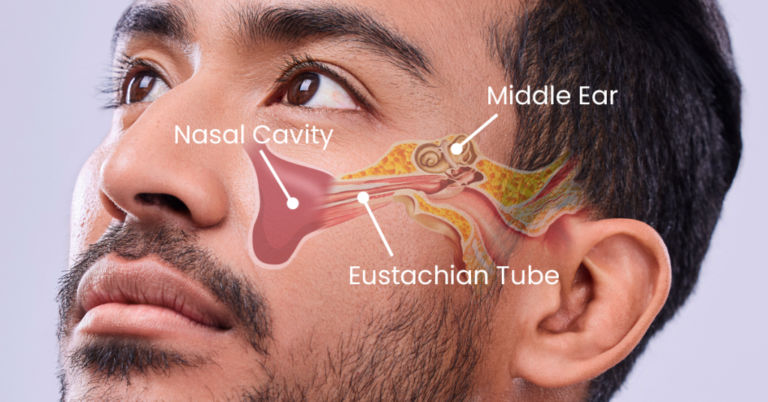Today, air pollution is a concern on the planet, and it affects the human health in a very detoriorial way. You may usually connect it with respiratory problems and lung problems, but it is so important to understand its effect on the health of your throat. Air pollution and throat related reportedly involve the irritations and infections to the pharynx and potential risk of throat cancer, reported the article.

Air Quality and Its Impact on Throat Health
Depending on air quality, your throat is exposed to the effects of air pollution. People tend to suffer from throat discomfort where air quality is poor. Common throat-related issues arising due to pollution include:
• Throat Irritation: Particulate matter, volatile organic compounds and allergens can cause scratchy, sore throat, persistent cough and dryness. Ozone and nitrogen dioxide can irritate the throat if pollutants such as these exacerbate inflammation.
• Throat Infections: Pollutants can severely weaken the body’s natural defence, and in some cases, even those who are normally very robust can become more susceptible to bacterial or viral infection. Typically, these infections involve the painful sore throat, fever and difficulty swallowing.
• Throat Cancer: The link between air pollution and throat cancer, while less direct than with lung cancer, is nevertheless there: when certain pollutants are inhaled repeatedly, for example polycyclic aromatic hydrocarbons (PAHs), the risk increases. Usually found in car exhaust and industrial emissions, thus over time it can damage cells and increase the odds of cancers in the throat.
• Sore Throat: People who live in urban environments and come into contact with airborne irritants often complain of sore throats, and especially when in proximity to a highway, a factory, or high traffic areas. Symptoms common to the children include a scratchy throat, hoarseness and the feeling that something is stuck in the throat. Limiting your exposure, staying hydrated, gargling with salt water, and use of lozenges or sprays are remedies.
• Aggravation of Existing Conditions: People who have asthma, allergies or similar respiratory illness are extra vulnerable to the effects of air pollution. Chronic coughing, wheezing and difficulty breathing may be worsened by polluted air. Air pollution can intensify the pain of those with pre-existing throat conditions and slow down recovery.
Sources of Air Pollution
Dust and Micro Dust as Pollutants
Dust and micro dust particles are major contributors to air pollution. Often originating from industrial activities, vehicular emissions, and natural events like wildfires or dust storms, these tiny particles can infiltrate the respiratory system, causing throat irritation, exacerbating asthma, and leading to long-term health issues. Micro dust particles are small enough to enter the bloodstream, affecting various organs, including the throat and lungs.
Air Pollution from Vehicles
The other important point source of air pollution includes vehicles especially in urban areas. Pollutants produced by fossil resources include carbon dioxide, nitrogen oxides, sulphur dioxide, carbon monoxide and particulate matters. It does so while damaging the throat tissues as well as the greater environment through global warming and smog creation.
Evaluating throat irritation risks by populations, those in the urban area are in a worse off position due to high exposure to vehicle emissions. This calls for implementation of low carbon technologies which comprise efficiency improvement, clean fuels and environmentally friendly modes of transport including electric cars and environmentally friendly transport system.
Industrial and Agricultural Pollution
There are emissions from industries and farming activities are other causes of air pollution, which contributes to emission of chemicals like ammonia, methane and volatile organic compounds. These pollutants cause allergic reactions and aggravate throat inflammation, and respiratory diseases. In the agricultural areas they also make use of crops to be burnt and certain pesticides which pollute the air and hence cause effects to throat health.

Monitoring Air Quality and Throat Health
To protect your throat, monitoring air quality is essential. Real-time tools like air quality indexes (AQI) provide valuable insights into pollution levels. These indexes offer an easy-to-understand rating of air quality in your area and help you make informed decisions about when to stay indoors or wear protective masks.
Indoor air quality can also be improved using air purifiers and proper ventilation. Many air purifiers are equipped with HEPA filters that effectively remove fine dust particles and other pollutants. Additionally, maintaining proper ventilation in indoor spaces can help circulate fresh air, reducing the concentration of indoor air pollutants.
Practices for Preserving Throat Health
• Use Air Purifiers: Use air purifiers with HEPA filters to reduce indoor pollutants. The particles get caught in the tangles to prevent particulate matter, dust or allergens choking your throat.
• Ensure Regular Ventilation: Open windows or use exhaust fans to allow fresh air circulation into indoor spaces particularly during times of high outdoor pollution.
• Stay Hydrated: Dryness caused by poor air quality is alleviated by drinking plenty of water. They can also be used to add moisture to dry indoor air, which prevents the throat from being irritated.
• Stay Informed: Read air quality forecasts regularly and protect yourself on days with high pollution. Try to limit your outdoor activities during the worst of the pollution times, early mornings and late afternoons, and avoid strong exercise outside.
• Seek Medical Advice: If your throat is persistently irritated, painful or uncomfortable, you should see a healthcare professional. Early detection of infections or more serious conditions can mean treatment at an earlier stage and prevent long term damage.
Conclusion
Pollution of the air and its correlation with throat health is a complex issue with issues that vary from simple throat discomfort to long term dangers. Therefore, it is recommended to receive timely updates on air quality, regularly check the quality of the breathed in air, and take all necessary precautions so that air pollution affects the throat and the rest of the body as lightly as possible.
Covering one’s throat is important for cleanliness, but especially for those living in polluted cities and towns. If any of the symptoms worsens and becomes persistent, then it may be important to visit the hospital in order to improve on your health status.
To know about how Smoking Affects Your Throat and Voice click here to read







